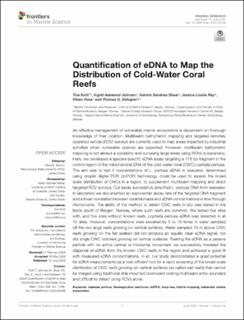| dc.contributor.author | Kutti, Tina | |
| dc.contributor.author | Johnsen, Ingrid A. | |
| dc.contributor.author | Skaar, Katrine Sandnes | |
| dc.contributor.author | Ray, Jessica Louise | |
| dc.contributor.author | Husa, Vivian | |
| dc.contributor.author | Dahlgren, Thomas Gunnar | |
| dc.date.accessioned | 2020-11-06T08:54:24Z | |
| dc.date.available | 2020-11-06T08:54:24Z | |
| dc.date.created | 2020-08-14T14:13:44Z | |
| dc.date.issued | 2020 | |
| dc.identifier.citation | Frontiers in Marine Science. 2020, 7:446 1-12. | |
| dc.identifier.issn | 2296-7745 | |
| dc.identifier.uri | https://hdl.handle.net/11250/2686662 | |
| dc.description.abstract | Marine litter harms marine life, human wellbeing and the provision of clean seafood. In the Barents Sea, a high portion of this source of pollution derives from fisheries. However, there remains a knowledge gap between fishers' attitudes towards litter and their practices when it comes to marine litter onboard their vessels and in harbors. By applying the conceptual lenses of social institutions, this study aims to explore the institutionalization of new practices among fishers to handle marine waste, as well as possible measures to reduce it. Empirical data derives from 21 qualitative interviews with fishers from Northern Norway. The data indicate that there has been a shift in fishers' attitude, partly because of media focus on this environmental issue and awareness campaigns from fishers’ organizations. However, increased sensitivity to the problem has not completely translated into effective practices to address it. The institutionalization of desirable values and practices is hindered by the lack of infrastructure, institutional support and appropriate practical arrangements in harbors. We conclude that increased awareness has limited impact (and can potentially be invalidated), if not accompanied by a system designed to support environmentally adequate choices. Progress on addressing the problem of marine litter depends on the institutionalization of environmental practices, and these are contingent upon an integrated approach between operations at sea and on land. | |
| dc.language.iso | eng | |
| dc.rights | CC BY 4.0 | |
| dc.rights.uri | https://creativecommons.org/licenses/by/4.0/ | |
| dc.title | Quantification of eDNA to map the distribution of cold-water coral reefs | |
| dc.type | Peer reviewed | |
| dc.type | Journal article | |
| dc.rights.holder | © 2020 Kutti, Johnsen, Skaar, Ray, Husa and Dahlgren | |
| dc.description.version | publishedVersion | |
| cristin.ispublished | true | |
| cristin.fulltext | original | |
| cristin.qualitycode | 1 | |
| dc.identifier.doi | 10.3389/fmars.2020.00446 | |
| dc.identifier.cristin | 1823381 | |
| dc.source.journal | Frontiers in Marine Science | |
| dc.source.volume | 7:446 | |
| dc.source.pagenumber | 1-12 | |

